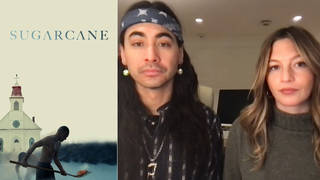
Topics
Guests
- John CerqueiraWon a discrimination lawsuit against American Airlines. He was awarded $400,000.
- Michael KirkpatrickAttorney who represented John Cerqueira in a lawsuit against American Airlines. He is with the Public Citizen Litigation Group in Washington, D.C.
A Boston jury has awarded $400,000 to a Portuguese-born U.S. citizen in what is being described as the first legal victory in an airline racial profiling case since 9/11. John Cerqueira was removed from an American Airlines flight at Boston’s Logan Airport in 2003 along with two Israeli passengers who were seated next to him. All three were held by state police, interrogated for two hours, and then denied further service by American Airlines. [includes rush transcript]
Transcript
JUAN GONZALEZ: A Boston jury has awarded $400,000 to a Portuguese-born U.S. citizen in what is being described as the first legal victory in an airline racial profiling case since 9/11. John Cerqueira, a computer consultant, was removed from an American Airlines flight at Boston’s Logan Airport in 2003 along with two Israeli passengers who were seated next to him. The Israeli passengers had been speaking in Hebrew and heavily accented English. All three were held by state police, interrogated for two hours, and then denied further service by American Airlines.
Cerqueira charged that he had been removed from the flight with the other two passengers because of their Middle Eastern appearance. American Airlines defended their actions and stated in the suit that they would have done the same thing today. The jury ruled in Cerqueira’s favor last Friday.
AMY GOODMAN: American Airlines denied a request for an interview, but Tim Wagner, a spokesperson, released a written statement that said, quote, “While we respect the jury system, we disagree with this verdict. This decision is simply not supported by the facts or the law. We will evaluate our legal options.”
Well, John Cerqueira now joins us in the studio in Los Angeles. His attorney in the case, Michael Kirkpatrick, is on the phone with us from Washington, D.C. His attorney is with the Public Citizen Litigation Group. John, tell us what happened. Start off — when was it in 2003?
JOHN CERQUEIRA: December 28, 2003.
AMY GOODMAN: And where were you going? And just describe exactly what you and these other passengers experienced.
JOHN CERQUEIRA: Well, I was returning home from a trip to visit my family in Massachusetts, and I was returning to Fort Lauderdale. I had a very early morning flight, and my family dropped me off at the airport quite early. I went through security. I went to the gate, and I asked for an exit row or bulkhead seat. I work often on the plane with my computer laptop and appreciate the extra legroom in order to be able to work more comfortably.
After I boarded the plane, I went to the bathroom, and then I went back and sat in my seat. Shortly thereafter, the two foreign gentlemen boarded the plane. They were louder than your typical passengers, and they were speaking a mixture of English and a foreign language. And I was working on my computer, didn’t really pay that much attention to them. Shortly thereafter, I put my computer away and fell asleep and was awoken by an American Airlines personnel, who was asking the three of us for our boarding passes, and then the state troopers came on board and took the three of us off the plane.
AMY GOODMAN: You didn’t know the other men?
JOHN CERQUEIRA: No.
JUAN GONZALEZ: And what did they tell you when they brought you in, when the state troopers began to question you?
JOHN CERQUEIRA: Actually, we weren’t given any information as to why this was happening. There were a lot of questions as to how I knew the other two, how the other two knew me, what we were all doing on the plane. But we weren’t given any information. We were detained and just asked questions.
JUAN GONZALEZ: And how long were you held?
JOHN CERQUEIRA: About two hours.
JUAN GONZALEZ: And at the end of that period, they told you that they would not be allowing you to get on the plane?
JOHN CERQUEIRA: That’s not correct. At the end of the two hours, we were told we were released for travel, and we were taken to the American Airlines ticket counter, and we were told that American Airlines would take care of us from that point on.
AMY GOODMAN: I want to turn now to your attorney, to Michael Kirkpatrick. You’ve represented John Cerqueira in a lawsuit against American Airlines. Can you talk about how you shaped this lawsuit? You’re with Public Citizen Litigation Group.
MICHAEL KIRKPATRICK: Yes, well, the lawsuit was brought to vindicate John’s civil rights, and obviously the airline claimed that what they did was related to legitimate security concerns. We felt that there was no legitimate reason for removing Mr. Cerqueira from the airplane and for — certainly for refusing to rebook him after the state police had questioned him and cleared him.
Our theory was that if Mr. Cerqueira did not have a Middle Eastern appearance, if he wasn’t perceived to be Middle Eastern, and if he hadn’t been sitting next to these other two gentlemen who were from the Middle East, and they were speaking in a foreign language, none of this ever would have happened. And that’s racial profiling. That’s discrimination, and it’s against the law. American tried to say that they had legitimate security concerns, and that that somehow trumped Mr. John Cerqueira’s civil rights, and I think the jury sent a strong message that an airline cannot just make vague references to security issues and use that as an excuse to trample on someone’s civil rights.
JUAN GONZALEZ: I’m curious. In the trial, how did they explain what the security concerns were, and what triggered them or what justified, even after he was interviewed and released by the state police, their refusing to put him on a plane?
MICHAEL KIRKPATRICK: Well, with regard to the initial decision to have him removed from the plane for questioning by the police, they said that it was a combination of factors. They alleged that Mr. Cerqueira had asked for his seat change in a very insistent, and they described it as hostile, manner. They said that they were worried that he happened to be the first passenger into coach and that he went to the lavatory, but they really couldn’t explain how that indicated a security threat, because they admitted that that is all common airline passenger behavior. There’s nothing odd about asking for a seat change or using the lavatory, etc. So they tried to say that those observations of Mr. Cerqueira’s behavior, joined with observations of the two Israelis next to him, who were sort of loud and boisterous and clowning around a bit and attracting attention to themselves, that in total all of those circumstances raised a suspicion that something was amiss.
I don’t think the jury believed that those observed behaviors, standing alone, would have resulted in his removal, but for the perception that he was Middle Eastern and but for the perception that he was traveling with the men seated next to him.
With regard to the failure to rebook at the ticket counter, that’s the part of this case that American Airlines never adequately explained. The person who made that decision testified that he didn’t recall the specific information that he relied on to make the decision to refuse rebooking. They inferred that it was the same information that they had relied upon for the initial removal, but the jury wasn’t buying that, because by this point the police had cleared Mr. Cerqueira, found that there was nothing wrong, nothing amiss, and that he could travel. And American Airlines just never offered a logical, rational explanation.
So, the jury, I believe, concluded that in the absence of any logical, rational explanation for this, discrimination was at work, and that’s why they came back with a significant victory for Mr. Cerqueira, including an award of punitive damages, which is in addition to compensatory damages that compensate Mr. Cerqueira for what happened. The punitive damages are designed to deter future behavior by the airline and to send a message, and that’s very important here, because the airline did argue that they have nothing to apologize for and that they would do the same thing today. And I think the jury strongly disagreed with that position, and that’s why we sought a punitive damage award.
AMY GOODMAN: So, it all added up to $400,000, or was it more?
MICHAEL KIRKPATRICK: No. It adds up to $400,000. It was $130,000 to compensate Mr. Cerqueira for what happened to him, and then it was an additional $270,000 in punitive damages to deter American Airlines from engaging in this kind of behavior in the future.
AMY GOODMAN: Michael Kirkpatrick, did you represent the Israelis, as well?
MICHAEL KIRKPATRICK: No. The Israelis were just visiting the United States, returned to their country, and as far as we can tell, they never brought any legal action.
AMY GOODMAN: John Cerqueira, the Boston Herald said the airline alleges in its brief that John Cerqueira, quote, “spent an inordinate amount of time in the jet’s bathroom and appeared to be feigning sleep.” One of the men, American argues, approached the captain and made strange comments to him. Your comment, John?
JOHN CERQUEIRA: Well, I used the bathroom for a normal amount of time, and I was asleep, because I had only a couple hours’ sleep the night before, and I was tired. And I didn’t say one word to anyone on the plane until the American Airlines personnel approached me and asked me for my boarding pass immediately before the three of us were taken off the plane.
AMY GOODMAN: So, John, what are you going to do with the money? Is American Airlines appealing?
JOHN CERQUEIRA: I couldn’t say whether American Airlines is appealing or not. I don’t know that information.
AMY GOODMAN: What are your plans?
JOHN CERQUEIRA: Well, my plans are just to go on with my life. And I’m very grateful to Public Citizen and Michael Kirkpatrick and David Godkin of Birnbaum & Godkin in Boston, Massachusetts, for having taken this case, and I believe they did so because they were interested in preserving the rights of the American people. I’m very grateful for the jury. And I’m also very grateful for the attention that this case has had, because I think these kinds of issues happen all the time, and I don’t think they get much attention in the media. So I’m just grateful for the opportunity to discuss my story, and I hope that this helps deter future incidents of racial profiling from happening.
AMY GOODMAN: And in terms of your decision to initially to pursue this matter, because I know it happens to a lot of people and it’s just forgotten, but you decided to go to court and pursue it. What made you make that decision?
JOHN CERQUEIRA: Well, originally, I was very concerned about travel, not only on American Airlines, but any other airline, because I travel for work, and, you know, I was concerned that this was somehow going to impact my ability to travel, possibly jeopardize my freedom. I was concerned about being put on any kind of watch list, so it was very important for me to seek some legal assistance to ascertain that that wasn’t going to happen. And the more I found out about the case, the more committed I was to pursuing this process, because what happened to me just didn’t make any sense. I could see no reason for American’s behavior, other than the fact that they were racial profiling and that the behavior of the two gentlemen sitting next to me were I imputed on to me by their perceiving us to be together based on our looks.
JUAN GONZALEZ: [inaudible] fly American anytime soon?
JOHN CERQUEIRA: I have no plans to. I’m dismayed and discouraged that to this day they disagree that something that they did was wrong.
AMY GOODMAN: Well, John Cerqueira and Michael Kirkpatrick, I want to thank you both for joining us.













Media Options